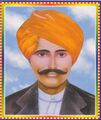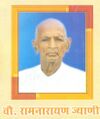Gramotthan Vidyapeeth Sangaria
| Author: Laxman Burdak, IFS (R) |
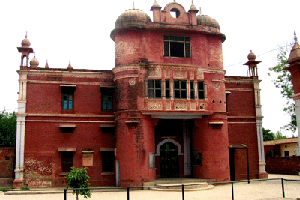
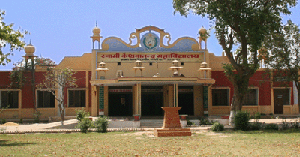
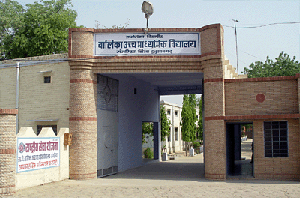
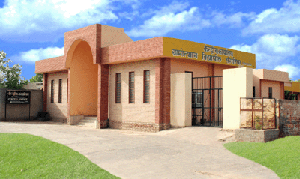
Gramotthan Vidyapeeth Sangaria (ग्रामोत्थान विद्यापीठ संगरिया) is an educational Institute situated in town Sangaria in Hanumangarh, Rajasthan.
The beginning
It was Chaudhary Bahadur Singh Bhobia a soldier, who resolved to abolish illiteracy from the area. Accordingly he, with the help of some like-minded friends, opened Jat middle school in 1917 and Thakur Gopal Singh provided 14 Bighas of land for the establishment of the school. Despite grave financial crisis, the school continued to run upto 1932. In 1932 it reached to the verge of closure but was saved by Swami Keshwanand ji who took over its charge. People of the area helped Swami ji very enthusiastically. Consequently pucca buildings continued to replace old mud houses, facilities continued to add and new departments continued to be added. By the time Swami Keshwanand ji left for his heavenly abode this Jat Middle School had acquired the stature of a large Educational, institution, namely Gramotthan Vidyapeeth.
It is interesting to know its background history in details. On 9 August 1917, Chaudhary Bahadur Singh Bhobia with the help of Swami Mansanath and Thakur Gopal Singh Panniwali, starteded a school named "Jat Anglo Sanskrit Middle School" in sarrafo-ki-dharmshala in Hanumangarh town in Rajasthan, India. This was later shifted to Sangaria. There was a need of funds to expand Sangaria Jat School and Hostel. Chaudhary Bahadur Singh was under great pressure of expanding work of the school. Due to excessive work of 5-6 years, his health started deteriorating. In the month of May 1924 he was on continuous tour of the desert area to collect funds for the school. He got infected with Malaria during the tour and died of Malaria on 1 June 1924.[1]
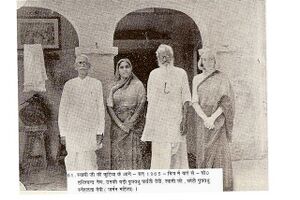
The untimely death of Chaudhary Bahadur Singh was a great setback for Jat School Sangaria. Chaudhary Harish Chandra Nain took the help of other Sardars of the region such as
- Ch.Jiwan Ram Kadwasra, Deengarh,
- Ch. Harji Ram Godara, Malot,
- Ch. Sardara Ram Chautala,
- Ch. Har Ram Chautala,
- Ch. Mani Ram Sihag,
- Ch. Ganga Ram Dhaka,
- Ch. Siv Karan Singh Chautala etc.
Though Chaudhary Harish Chandra was associated with Jat school Sangaria from 1918 yet after the death of Chaudhary Bahadur Singh, Chaudhary Harish Chandra Nain started to look after the School. From 1924 to 1932 he on his own run the school. After the Executive Meeting of 18 December 1932 Swami Keshwanand took over the charge of this school.[2] [3]
Gramothan Vidyapith

The Jat School Sangaria was renamed as Gramothan Vidyapith, Sangaria in 1948. Swami Keshwanand was connected with Gramothan Vidyapith, Sangaria (Rajasthan) (1932-1952). He developed here a beautiful museum with collection of rare documents, ancient items, paintings etc. brought from various places. Large-scale plantations were done in this arid area with the help of people and students of the Institute. Gramothan Vidyapith, Sangaria had become center of inspiration for educationists from India and abroad.
After the demise of Swami Keshwanand, the Managing Committee aided by the people of the area continued to lead it on the path of development. In 1977 commerce faculty and in 1980 P.G. classes were added to Swami Keshwanand College. Similarly M.Ed. classes were added to G.V. college of education and teaching of Library Science was also carried on in this college for a few years.
In 1996 the history of the institution took a new turn when new Managing Committee took over the charge of the institution under the leadership of Ch. Abhay Singh Chautala. Consequently remarkable development works have taken place within two years. Swami Keshwanand Memorial Public School and Home Science College were started, Krishi Vigyan Kendra has also established with the financial assistance received from the Indian Council of Agriculture Research. At present, it is a big organization consisting of ten sister concern.
Sir Chhotu Ram Museum
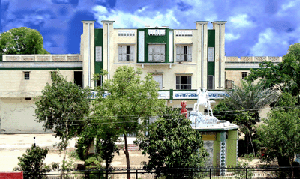

It is a rare museum established by a Saint, a person who was denied any kind of formal school education.
Such a museum is adorned at the place named Sangaria. Its foundation stone was laid down by Swami Keshwanand. He adopted sainthood in his early childhood days and arrived at Sangaria in 1932. In those days a resource deficient Middle School was running here. He undertook the responsibility of running the school and slowly & steadily, it was the result of his 40 years hard work & efficiency an institution with many schools & colleges. Not only this, but he also founded Sir Chhotu Ram Memorial Museum.
There is a very interesting story behind the establishment of the museum. Swami Keshwanand found some stone status from somewhere. At that time we was not aware of historical value and importance of these statues. In 1938 he kept those statues in the campus of his school hostel. When the students started playing about with these statuses he removed them from there and placed them in a room.
People started coming to the room in order to see those statues. This instance inspired Swami Keshwanand and he started collecting rare and unique things consequently a museum was born.
Wherever Swami Keshwanand went he brought statues, pictures, coins, clothes & numerous other items with him. Subsequently, after some time the items were increased in such a large manner that many rooms & galleries were constructed for the museum on the first floor of the huge school building. On the upper floor of the museum a huge library with thousands of books, was also established. This museum library was not only visited by learned and common people but also by our first Prim Minister Pandit Jawahar Lal Nehru, Shri Lal Bahadur Shastri, Mrs. Indira Gandhi, Chaudhary Charan Singh and many other politicians.
Later on a separate building was built for the museum. The building comprises of galleries, six big rooms in which there is a collection of very precious & valuable things related to history, art & folk culture.
Not only this but, we also find things related to foreign countries. Especially, the photographs of the huge, Kamandal, of Maharaja Ranjit Singh’s Court & of the “Chamber of Princess” (Feb 14; 1921) are picturesque & worth watching.
The building of the museum is situated amidst a lush green park. At the main entrance there is a huge statue of Rani Lakshmibai. Moreover, nearby is a memorial temple of Swami Keshwanand ji.
Departments in Gramotthan Vidyapeeth
- G.V. Senior Secondary School (Boys), Sangaria (Estd-1917)
- Sh. Chhotu Ram Memorial Museum, Sangaria (Estd-1938)
- GV Primary School (Estd-1950)
- Gramotthan Vidyapeeth Girls Senior Secondary School (Estd-1955)
- Central office, Sangaria (Estd-1960)
- Swami Keshwanand College (G.V.), Sangaria (Estd-1962)
- G.V. College of Education, Sangaria (Estd-1965)
- Gramotthan Vidyapeeth Home Science Women College (Estd-1994)
- Krishi Vigyan Kendra GV Sangaria (Estd-1996)
- Swami Keshwanand Memorial Public School (Estd-1996)
जाट विद्यालय संगरिया
ठाकुर देशराज[4] ने लिखा है ....पुराने जमाने में भारतवर्ष में गुरुकुलों की प्रणाली थी। हरेक वंश का एक राज्य होता था और हर वंश का कोई न कोई एक व्यक्ति कुल गुरु होता था। उसी कुल गुरु का एक गुरुकुल होता था। जिसमें उस वक्त राज्य के बच्चे शिक्षा पाते थे।
शिक्षा की वह प्रणाली अवशेष नहीं किंतु संगरिया जाट हाई स्कूल वास्तव में बीकानेर के जाटों का गुरुकुल साबित हुआ। इसे जिन लोगों ने जन्म दिया वह आर्य समाजी विचार के पुरुष ही थे। इसलिए आरंभ से ही यह संस्था गुरुकुल के ढंग पर ही संचालित हुई। इसकी स्थापना अगस्त 1917 में स्थानीय चौधरी बहादुरसिंह भोबिया, स्वामी मनसानाथ, चौधरी हरजीराम मंत्री और चौधरी हरिश्चंद्र के प्रयत्न से हुई।
यह संस्था उस समय तक डावांडोल भी रही जब तक यह किसी ऋषि के हाथ में नहीं सौंपा गया। आजकल ऋषि
[पृ.118]: कहां है ! किंतु बीकानेर के देहातियों का यह सौभाग्य है उन्हें आज से 20 वर्ष पहले एक ऋषि का सहयोग मिला। उन राजर्ष स्वामी केशवानंद जी ने इस संस्था को एक आदर्श शिक्षा संस्था बना दिया। समस्त राजस्थान में इसके जोड़ की ऐसी शिक्षा संस्था नहीं जो इस की भांति पूर्ण हो।
राष्ट्र निर्माण के प्रत्येक प्रगति से शिक्षण संस्था अपने को पूर्ण बनाने में संलग्न है। इसमें शोध और पुरातत्व का विभाग है जो पालन और वैदनिक के विभाग हैं। यहां पर कताई, बुनाई, रंगाई, चित्रकला आदि की लोकोपयोगी शिक्षा दी जाती है।
बीकानेर के देहातियों के लिए, खासतौर से जाटों के लिए, यह एक तीर्थ है और ठीक वैसा ही पवित्र तीर्थ है जैसा बौद्धों के लिए सारनाथ और हिंदुओं के लिए बनारस। मैं इसे समस्त जांगल देश का एक सुंदर उपनिवेश और जीवन को स्फूर्ति देने वाला उच्चकोटि का शिक्षा आश्रम मानता हूं।
इसे पतना मोहक और उच्च रुप देने का सारा श्रेय स्वामी केशवानंद जी महाराज और उनके सहयोगियों को है।
ठाकुर गोपालसिंह जी पन्नीवाली और उनके पुत्र ने इस पवित्र शिक्षण संस्थानों को जमीन देने का सौभाग्य प्राप्त किया। जिन लोगों ने इस संस्था में आरंभिक शिक्षा प्राप्त करके आगे उच्च शिक्षा, औहदे आदि प्राप्त किए उनमें चौधरी शिवदत्त सिंह, चौधरी रामचंद्र सिंह, चौधरी बुद्धाराम, चौधरी सदासुख, चौधरी सूरजमल आदि पचासों और सज्जनों के नाम ओजस्वनीय हैं।
External links
- Swami Keshwanand Charitable Smriti Trust
- Gramothan Vidyapith Sangaria
- Swami Keshwanand Gramothan Vidyapeeth Sangaria on Gooogle
Gallery of people associated with Gramotthan Vidyapeeth
-
Chaudhary Bahadur Singh Bhobia (1882 - 1924)
-
Swami Keshwanand (1883-1972)
-
Gramotthan Vidyapith team in 1957
-
Mr. G D Rudkin, Commissioner Colonization Bikaner, 1927, a sympathizer of Jat Vidyalay Sangaria
-
Sir Chhotu Ram (1881-1945)
-
Ramnarayan Jyani (1924-2009)
-
Sher Singh Toor, Ex. Principal of Gramotthan Vidyapith Sangaria.
-
Kewal Ram Sharma Vyayam Teacher Jat Vidyalay Sangaria
References
- ↑ Dr Pema Ram, Jaton ki Gauravgatha, p.62
- ↑ Thakur Deshraj, Chaudhary Harish Chandra Nain, 1964, p. 66
- ↑ Dr Pema Ram, Jaton ki Gauravgatha, p.63
- ↑ Thakur Deshraj:Jat Jan Sewak, 1949, p.117-118
Back to Jat Educational Institutes


